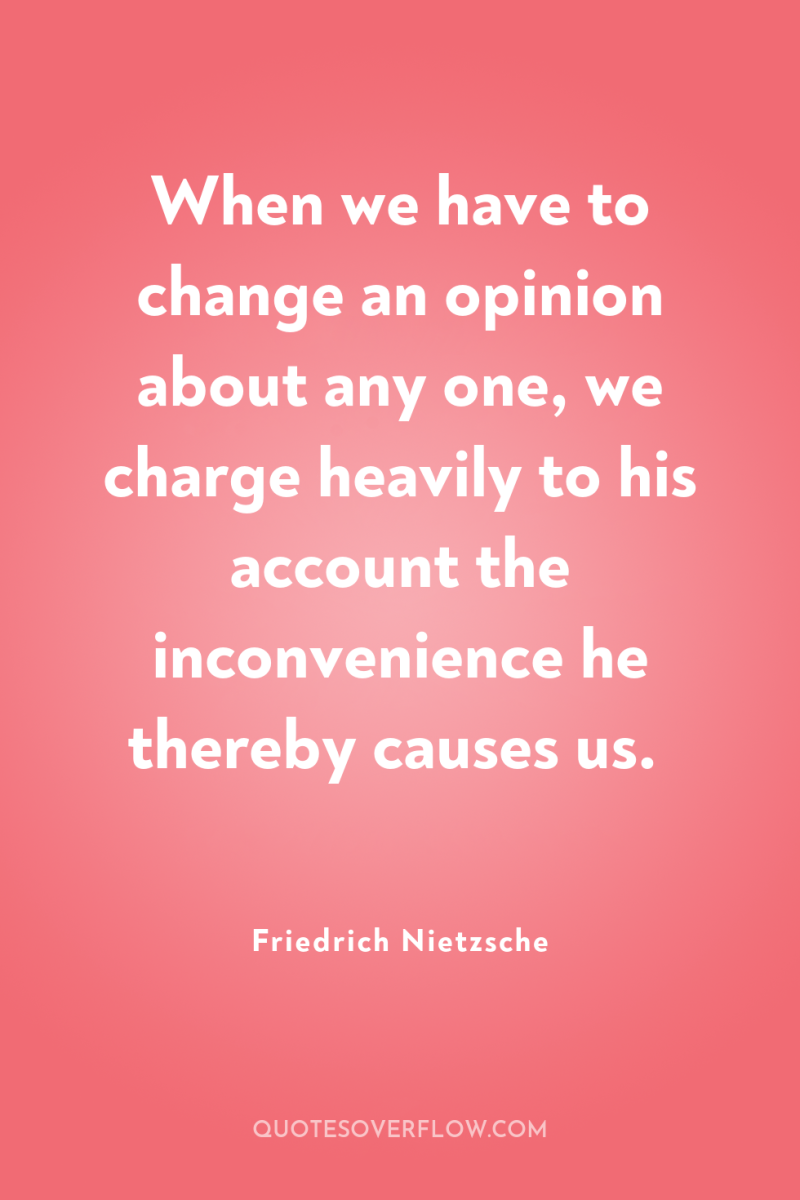1
In the end things must be as they are and have always been--the great things remain for the great, the abysses for the profound, the delicacies and thrills for the refined, and, to sum up shortly, everything rare for the rare.Friedrich Nietzsche
2
Madness is something rare in individuals – but in groups, parties, peoples, and ages, it is the rule.Friedrich Nietzsche
3
Love as a passion–it is our European specialty–must absolutely be of noble origin; as is well known, its invention is due to the Provencal poet-cavaliers, those brilliant, ingenious men of the "gai saber, " to whom Europe owes so much, and almost owes itself.Friedrich Nietzsche
4
Their [philosophers] thinking is, in fact, far less a discovery than a re-recognizing, a remembering, a return and a home-coming to a far-off, ancient common-household of the soul, out of which those ideas formerly grew: philosophizing is so far a kind of atavism of the highest order.Friedrich Nietzsche
5
The maturity of man–that means, to have reacquired the seriousness that one had as a child at playFriedrich Nietzsche

6
A soul that knows it is loved but does not itself love betrays its sediment: what is at bottom comes up."― Epigrams and Interludes, Section 79Friedrich Nietzsche
7
It may be that until now there has been no more potent means for beautifying man himself than piety: it can turn man into so much art, surface, play of colors, graciousness that his sight no longer makes one suffer.---Friedrich Nietzsche
8
Success has always been the greatest liar - and the "work" itself is a success; the great statesman, the conqueror, the discoverer is disguised by his creations, often beyond recognition; the "work, " whether of the artist or the philosopher, invents the man who has created it, who is supposed to have create it; "great men, " as they are venerated, are subsequent pieces of wretched minor fictionFriedrich Nietzsche

9
When we have to change an opinion about any one, we charge heavily to his account the inconvenience he thereby causes us.Friedrich Nietzsche
10
Men have hitherto treated women like birds which have strayed down to them from the heights; as something more delicate, more fragile, more savage, stranger, sweeter, soulful — but as something which has to be caged up so that it shall not fly away.Friedrich Nietzsche

11
Christianity gave Eros poison to drink; he did not die of it, certainly, but degenerated to Vice.Friedrich Nietzsche
12
Just as little as a reader today reads all of the individual words (let alone syllables) on a page–rather he picks about five words at random out of twenty and "guesses" at the meaning that probably belongs to these five words–just as little do we see a tree exactly and completely with reference to leaves, twigs, color, and form; it is so very much easier for us to simply improvise some approximation of a tree. Even in the midst of the strangest experiences we will still do the same: we make up the major part of the experience and can scarcely be forced not to contemplate some event as its "inventors." All this means: basically and from time immemorial we are–accustomed to lying. Or to put it more virtuously and hypocritically, in short, more pleasantly: one is much more of an artist than one knows.Friedrich Nietzsche
13
You desire to LIVE "according to Nature"? Oh, you noble Stoics, what fraud of words! Imagine to yourselves a being like Nature, boundlessly extravagant, boundlessly indifferent, without purpose or consideration, without pity or justice, at once fruitful and barren and uncertain: imagine to yourselves INDIFFERENCE as a power–how COULD you live in accordance with such indifference? To live–is not that just endeavouring to be otherwise than this Nature? Is not living valuing, preferring, being unjust, being limited, endeavouring to be different? And granted that your imperative, "living according to Nature, " means actually the same as "living according to life"–how could you do DIFFERENTLY? Why should you make a principle out of what you yourselves are, and must be? In reality, however, it is quite otherwise with you: while you pretend to read with rapture the canon of your law in Nature, you want something quite the contrary, you extraordinary stage-players and self-deluders! In your pride you wish to dictate your morals and ideals to Nature, to Nature herself, and to incorporate them therein; you insist that it shall be Nature "according to the Stoa, " and would like everything to be made after your own image, as a vast, eternal glorification and generalism of Stoicism! With all your love for truth, you have forced yourselves so long, so persistently, and with such hypnotic rigidity to see Nature FALSELY, that is to say, Stoically, that you are no longer able to see it otherwise–and to crown all, some unfathomable superciliousness gives you the Bedlamite hope that BECAUSE you are able to tyrannize over yourselves– Stoicism is self-tyranny– Nature will also allow herself to be tyrannized over: is not the Stoic a PART of Nature?.. But this is an old and everlasting story: what happened in old times with the Stoics still happens today, as soon as ever a philosophy begins to believe in itself. It always creates the world in its own image; it cannot do otherwise; philosophy is this tyrannical impulse itself, the most spiritual Will to Power, the will to "creation of the world, " the will to the causa prima.Friedrich Nietzsche
14
In music the passions enjoy themselves.Friedrich Nietzsche
15
To him who feels himself preordained to contemplation and not to belief, all believers are too noisy and obtrusive; he guards against them.Friedrich Nietzsche
16
Every select man strives instinctively for a citadel and a privacy, where he is FREE from the crowd, the many, the majority-- where he may forget "men who are the rule, " as their exception;-- exclusive only of the case in which he is pushed straight to such men by a still stronger instinct, as a discerner in the great and exceptional sense.Friedrich Nietzsche
17
One loves ultimately one's desires, not the thing desired.Friedrich Nietzsche
18
Whatever is done for love always occurs beyond good and evil.Friedrich Nietzsche
19
The consequences of our actions take hold of us, quite indifferent to our claim that meanwhile we have 'improved.Friedrich Nietzsche
20
One does not hate as long as one disesteems, but only when one esteems equal or superiorFriedrich Nietzsche
21
There is no such thing as moral phenomena, but only a moral interpretation of phenomenaFriedrich Nietzsche
22
[Anything which] is a living thing and not a dying body.. will have to be an incarnate will to power, it will strive to grow, spread, seize, become predominant - not from any morality or immorality but because it is living and because life simply is will to power.. 'Exploitation'.. belongs to the essence of what lives, as a basic organic function; it is a consequence of the will to power, which is after all the will of life. .Friedrich Nietzsche
23
That which now calls itself democracy differs from older forms of government solely in that it drives with new horses: the streets are still the same old streets, and the wheels are likewise the same old wheels.Friedrich Nietzsche
24
Objection, evasion, joyous distrust, and love of irony are signs of health; everything absolute belongs to pathology.Friedrich Nietzsche
25
Men of profound sadness betray themselves when they are happy: they have a mode of seizing upon happiness as though they would choke and strangle it, out of jealousy--ah, they know only too well that it will flee from them!Friedrich Nietzsche
26
When one is young, one venerates and despises without that art of nuances which constitutes the best gain of life, and it is only fair that one has to pay dearly for having assaulted men and things in this manner with Yes and No. Everything is arranged so that the worst of tastes, the taste for the unconditional, should be cruelly fooled and abused until a man learns to put a little art into his feelings and rather to risk trying even what is artificial – as the real artists of life do.Friedrich Nietzsche
27
Solitude is a virtue for us, since it is a sublime inclination and impulse to cleanliness which shows that contact between people, “society”, inevitably makes things unclean. Somewhere, sometime, every community makes people–“base.Friedrich Nietzsche
28
The vanity of others runs counter to our taste only when it runs counter to our vanity.Friedrich Nietzsche
29
One must shed the bad taste of wanting to agree with many. "Good" is no longer good when one's neighbor mouths it. And how should there be a "common good"! The term contradicts itself: whatever can be common always has little value. In the end it must be as it is and always has been: great things remain for the great, abysses for the profound, nuances and shudders for the refined, and, in brief, all that is rare for the rare. .Friedrich Nietzsche
30
I obviously do everything to be "hard to understand" myselfFriedrich Nietzsche
31
A man who wills commands something within himself that renders obedience, or that he believes renders obedience.Friedrich Nietzsche
32
One should part from life as Ulysses parted from Nausicaa-- blessing it rather than in love with it.Friedrich Nietzsche
33
Youth's longing misconceived inconsistency. Those whom I deemed Changed to my kin, the friends of whom I dreamed, Have aged and lost our old affinity: One has to change to stay akin to me.Friedrich Nietzsche
34
One is punished most for one’s virtues.Friedrich Nietzsche
35
Perhaps he even needs to have been a critic and a sceptic and a dogmatist and an historian, and in addition a poet and collector and traveller and puzzle-solver and moralist and seer and ‘free spirit’ and nearly all things, so that he can traverse the range of human values and value-feelings and be able to look with many kinds of eyes and consciences from the heights into every distance, from the depths into every height, from the corners into every wide expanse.Friedrich Nietzsche
36
It is the business of the very few to be independent; it is a privilege of the strong. And whoever attempts it, even with the best right, but without being OBLIGED to do so, proves that he is probably not only strong, but also daring beyond measure. He enters into a labyrinth, he multiplies a thousandfold the dangers which life in itself already brings with it; not the least of which is that no one can see how and where he loses his way, becomes isolated, and is torn piecemeal by some minotaur of conscience. Supposing such a one comes to grief, it is so far from the comprehension of men that they neither feel it, nor sympathize with it. And he cannot any longer go back! He cannot even go back again to the sympathy of men! .Friedrich Nietzsche
37
To vigorous men intimacy is a matter of shame--and something precious.Friedrich Nietzsche
38
With hard men intimacy is a thing of shame- and something precious.Friedrich Nietzsche
39
Almost everything we call "higher culture" is based on the spiritualization of cruelty.Friedrich Nietzsche